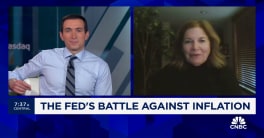Old Conventional Wisdom, Monday version: economists, markets thrilled with Fannie and Freddie conservatorship.
New CW, Tuesday version: maybe not so much.
After allowing 48 hours to digest the news of the government seizure of the two government sponsored enterprises, many columnists, analysts, and politicians were retrenching as they evaluated ramifications of the action. The revised takes on the takeover ranged from cautious optimism to crystal ball gazing, from unsought advice to angry expressions of betrayal. Reading through it all one gets a strong feeling that Freddie and Fannie aren't necessarily dead, a huge battle is looming, and the Bush administration may pay a price for their actions.
The Wall Street Journal says that if the Treasury Departments intervention is working we should see mortgage rates begin to fall and the GSEs starting to back more mortgages which, along with less stringent underwriting standards, may give the housing industry a small boost by bringing in fence-straddling buyers.
While there were immediate positive reactions to the move such as narrowing yields between U.S. Treasury bonds and corporate mortgage debt, "by the end of the day Monday, concerns about bank solvency and the weak economy returned." The article quoted Dominick DeAlto of Robeco Investment Management as saying "Just because you foster an orderly market doesn't mean the market is going to prosper."
Former Presidential candidate Steve Forbes, writing in his magazine suggests that the Treasury Department's actions were taken months too late but that now the two companies (who Forbes has renamed Fonie and Fraudie) should be broken up into 12 new companies, recapitalized to the tune of $300 billion and both common and preferred stockholders in the old companies allowed to trade their shares for common stock in the new companies.
Forbes also calls for more stringent regulation and then recapitalization of banks and action to strengthen the dollar. Forbes, of course, uses the occasion to warn about the danger of any tax increases.
The New York Times is reporting that "policy makers and Congress began [on Monday] what promises to be an epic political fight over how to revamp the companies once the current crises ends." These same factions, The Times reported, have also begun the ritual of assigning blame for events leading to that crisis.
The Times states that some senior Treasury Department officials want to shrink the companies and turn them into public utilities. This would result in tightly regulated entities with smaller investment portfolios. Another version would turn the GSEs into pure government agencies with management vested in government officials and profits returned to the Treasury. However, the paper also reports that many Democratic lawmakers still see Fannie and Freddie as instrumental in providing more affordable housing.
This group which counts among its numbers Rep. Barney Frank and Sen. Chris Dodd, chairmen of their respective banking committees appears to favor restoring the GSEs to health and then returning them, with additional safeguards, to their pre-crisis configuration.
Others, who The Times calls "free-market theorists," include some administration officials who prefer the idea of eliminating the companies and replacing them with privately held institutions that would not be tied to or supported by the government.
The Senate will soon hold hearings on the conservatorships but the future form of the companies will certainly not be determined before the end of the Bush administration.
In the meantime, Congress and the White House exchanged angry words over how the mortgage debacle played out. Presidential press secretary Dana Perino said that Congress had failed to act on administration recommendations for avoiding the crisis while Senator Dodd accused Treasury Secretary Henry Paulson of misleading lawmakers into giving him authority to spend huge amounts of money the rescue the GSEs while "assuring them at the time that he had no intention of using that authority." Dodd said that he had taken the administration at their word and said it found it hard to believe that the takeover was going to happen.
Rep. Frank seemed to feel that he could stop any administration efforts to shrink the companies and defended their ability to continue subsidizing the construction and financing of affordable housing. Frank mocked what he called the administration's intention of intending to control policy long after the next inauguration as "like me deciding what's going to happen in France."
In a separate article The Times suggested that more and more industries might be lining up to partake in government assistance in troubled times. The author, Nelson D. Schwartz, cited the recent $30 billion federal guarantee which enabled the purchase of Bear Stearns, the shoring-up of some airlines following 9-11, and the much older rescues of Lockheed and Chrysler. Now the broader auto industry is seeking help. Schwartz says that many in the financial industry say a more formal debate is needed to set criteria for help. For example, he asks, "should a large airline be allowed to fail while an automaker is bailed out? Or might one investment bank be judged as less critical to Wall Street's overall solvency than another?
Both Schwartz and the three reporters who wrote the WSJ article referenced above (Deborah Solomon, Michael Corkery, and Liz Rappaport) suggested that the takeover was pushed to a great extent by concern expressed by Asian investors who apparently regarded the close association of Freddie and Fannie with the U.S. government as a guarantee of their investments in the two companies.
This is just a sampling of the commentary regarding Sunday's action and news is also beginning to emerge about events leading up to it. Two nuggets of information: Freddie CEO Richard Syron fought to the end to save his company, traveling to New York to meet with potential investors who rejected every option he suggested. He finally had to meet with the Treasury Secretary to admit defeat. Fannie's president Daniel Mudd begged Treasury not to tie his company to Freddie saying his Fannie was still capable of raising capital. Secretary Paulson responded that the companies were joined at the hip and he would not treat one preferentially. He said he had no choice but to place both into conservatorship.







